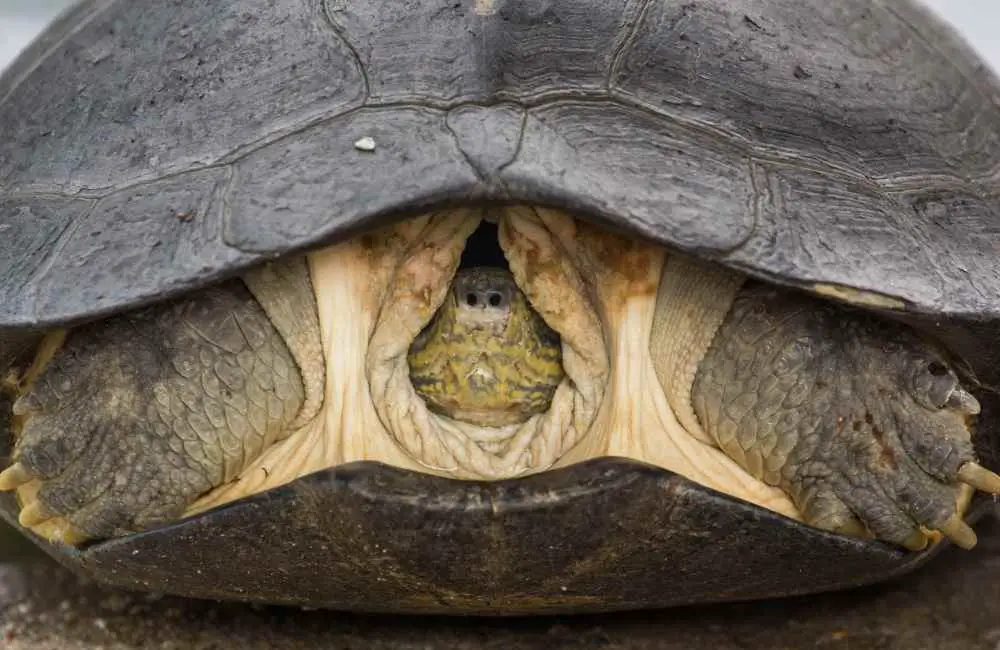Turtles are one of my favourite animals, and my opinion is shared with plenty of people. Their adorable little old man (or woman) faces remind us of dinosaurs, their slow but purposeful movements look like they’re on a mission in slow motion, and the way they can duck inside their shells at a moment’s notice are all things that people love about turtles.
Turtles are solitary creatures by nature and while they can still make great pets, their behavior can baffle humans at times — we’re a social species, after all! They often jump off their basking rocks into the water, swim down to the bottom of their tanks, or hightail it into their hides when we come near them for what seems like no reason.
My son found a turtle in a cardboard box on the sidewalk once, and she was always hiding from us at first. However, after a while she came around, and would even look for her food at feeding time! This is a perfect example of turtle behavior: it takes time for them to see us as trustworthy.
These solitary turtle behaviors can be normal under certain circumstances, but when it starts to happen out of nowhere it makes us wonder: why is my turtle suddenly scared of me? If you’re wondering why your turtle wants nothing to do with you all of a sudden, don’t worry — we’ll get to the bottom of it in this post.
Why is My Turtle Suddenly Scared of Me?
The short answer to this question could be a number of things. It could be something you did that frightened him, someone that came over that he felt uneasy around, or even a hidden heath problem. The long answer to this question is explained below. Here are some reasons your turtle might suddenly be scared of you, and what you can do to regain his trust:
You Make Sudden Movements
To most animals, sudden movements are scary. They’re unpredictable, could possibly be threatening, and make the animal feel like he needs to run for cover. Turtles are no different in this respect, but unlike most animals, they can’t run away as fast when something startles them.
Their most common reaction will be to retreat into their shell, or if they’re in their tank, to swim as far away as they can.
If you think this might be the problem with your turtle, try being aware of how quickly you move around him. Slow, intentional movements consistently and over time will hopefully gain back his trust.
Eventually he’ll come to realize that you’re not a threat, and you can become friends again. It definitely won’t hurt to associate yourself with food, either — feeding him his favorites at the same time every day will soon have him waiting happily to see you!
You’re Being Louder Than Usual
Turtles are quiet, sensitive creatures, despite their hard shells and adorably expressionless faces. They hear things differently than us, being better at hearing underwater than out of it — but they’re still super sensitive to vibrations and don’t do well when exposed to loud noises.
This goes for whether your turtle is underwater or out on the rocks, so it’s important to be aware of your volume when you’re around him.
If he’s associated you with scary loud noises, this might be why he shrinks away when you come into view. Like with the sudden movement advice, just take it slow and let him rebuild his trust in you.
Letting him see that you’re not loud and scary all the time will eventually start to take hold. You don’t have to whisper for the rest of your life or anything, just keep loud noises to a minimum and with time, he’ll come around again.
You Approached Him from the Side
Just like you don’t approach a horse from the front, you shouldn’t approach turtles from the side. They can’t see you there — they have literally no peripheral vision when their heads are retracted — so when you suddenly appear out of nowhere you surprise them.
Surprises are not a good thing in the eyes of a turtle (or any animal for that matter) and will likely cause him to retreat into his shell or down to the bottom of his tank, until he feels safe to come out again.
This one is an easy fix: just remember to approach your turtle head on so he can see you coming. However, don’t expect him to trust you again right away — patience and consistency are key here.
Make a habit of only approaching him from the front every time, and after a while he’ll start to get it. A piece of lettuce in your hand might sweeten the deal for him if he’s not too scared to take it, hopefully shortening the process a little for you!
He Doesn’t Have an Escape Option
Turtles are shy, solitary animals, and need to have a place to be alone sometimes. When they’re scared, tired, or just don’t feel like being social (which is a lot of the time) a half log or other type of hide in their tank is essential for them to have their “turtles only” space.
This is called a “safe zone,” and if your turtle doesn’t have one, he’s likely pretty stressed out most of the time. It’s also a good reason for him to be afraid of you: he has nowhere to go!
This is easily remedied by getting him a little cave for himself, which can be found easily at any pet or aquarium store. Make sure it’s wider and longer than he is so he won’t feel claustrophobic (or worse, get stuck), and put it on the opposite end of the tank from his basking rocks and heat lamp.
Let him have his alone time and don’t be too attentive — but watch him and see how relaxed he becomes over time. He’ll soon realize you’re not so terrifying when he has a place to run (or swim) to!
He’s Just Being a Turtle
As we discussed earlier, turtles aren’t super social animals. They’re cute, funny, and interesting, sure. But they probably (make that definitely) don’t think the same way about humans!
There’s a good chance that your turtle will become more social over time, once he develops positive associations with you being around. Try not to take it personally if your turtle seems afraid when you’re in the room with him — sometimes that’s just how turtles are.
Adhering to the advice in the above points, associating yourself with positive things (food, mainly), and not trying too hard to be friends when your turtle obviously wants to be alone will help him to build trust in you.
Remember that many turtle species live for over a century, so they’re slow when it comes to a lot of things — trusting people included! Patience and consistency will be your golden ticket to winning your turtle over again, so try not to get frustrated if things move a little slower than you’d like.
When to Seek Help
Just like any other animal, turtles should have regular vet appointments to make sure they’re healthy. It’s a little trickier with these guys since not all vets are equipped to care for turtles, but there are plenty out there. Having the number of your turtle’s vet on hand is always a good idea, especially when they start acting differently out of the blue.
If your turtle’s sudden shyness is accompanied by any other odd symptoms, it may not be you he’s scared of at all — it’s instinctual for animals to hide when they feel unwell, and that goes for turtles, too.
Signs to watch for in turtles include swollen eyes, floating abnormally, refusing to eat, changes to their stool, runny nose, and seeming lethargic — which is hard to decipher in turtles, I know, but you know your turtle’s normal behavior. Other signs could be soft spots on their shell, weakness of the limbs, bleeding from the shell, and a foul-smelling shell — all of which usually mean an infection is present.
If any of these symptoms are happening, or even if you’re just worried about your turtle suddenly acting scared of you, a visit to the vet is a good idea. At least if nothing’s wrong you can gain a little peace of mind, and if it is, your turtle can get the help he needs to start feeling like himself again.
You May Also Like:
Turtle Won’t Come Out of Shell – What To Do?


